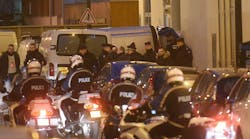Most days, the greatest workplace safety risks I face are paper cuts and eye strain. Once I fell out of my chair while conducting an interview because I reached too far over to toss a yogurt container into the trash. There were no reported injuries in that incident, though.
Today, I’m reminded that my profession is not without its risks. In fact, for many journalists, editorial cartoonists, reporters, camera operators, photographers and others (for the purposes of this blog, I’ll refer to all as “journalists”), our profession is deadly. Journalists are killed in wars, kidnapped and shot for angering the wrong people, killed in plane and helicopter and car crashes and today in Paris, murdered by terrorists.
Twelve people were killed this morning when terrorists stormed the offices of Charlie Hebdo, a French satirical magazine. Among the dead were two police officers responding to emergency calls and four were cartoonists. At least 11 people are injured, some seriously. Eyewitnesses said the gunmen shouted "Allahu akbar" – roughly translated means “God is greater” or “God is greatest” – and said that the prophet had been avenged.
Many of the building occupants evacuated to the roof, where they could see the gunmen firing at (and killing) police officers. A video posted by YouTube user Police Hour captured the panic and violence of the attack. (Warning: the content is disturbing.)
The magazine was controversial – an equal opportunity offender – and had been condemned by radical Muslims for publishing satirical cartoons lampooning the Prophet Mohammed.
I’ll be honest: I saw many of the cartoons published by Charlie Hebdo and they made me cringe. I personally am not a fan of lampooning religions, not because to do so might get me murdered, but because I think it shows a lack of respect for the beliefs of others.
That said, no one deserves to die for speaking his or her mind. As an American, freedom of speech is one of my fundamental rights and I believe in it not only for the people who agree with my views, but for everyone. I might not like what you have to say, but I’ll defend your right to say it. But am I willing to defend our right to free speech to my death?
Anyone who has done any investigative journalism has been subjected to threats. I’ve been threatened with lawsuits, called nasty names, shoved, physically intimidated and received enough threating emails and phone calls following one of our covers that my boss wanted to call the FBI and ask them to investigate. And I write for a business-to-business magazine!
As you can imagine, the vitriol directed at the staff of a magazine that mocked every sacred cow, including the world’s religions, was intense. In addition to widespread, vague threats made against the cartoonists and writers who worked there, the Charlie Hebdo offices were firebombed three years ago, the day it was set to publish an issue with a cover that featured a caricature of the Prophet Mohammed and named him “editor-in-chief,” mocking Islamic law.
Despite all of this, the men and women who worked and died in those offices refused to give in to threats. Editor Stephane Charbonnier told France’s Le Monde newspaper in 2012, “I'd rather die standing than live on my knees.”
He died standing, never having yielded an inch to his critics or the threats of extremists. He was a brave man with a biting sense of humor. HE was willing to die for MY right to free speech. I mourn his loss.

